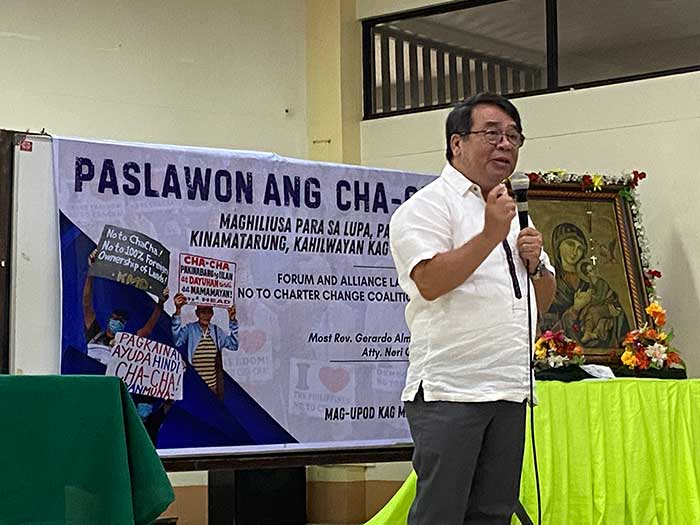By Joseph Bernard A. Marzan
A progressive former lawmaker insisted on Tuesday, February 20, that the government should give priority to resolving existing corruption issues and the development of national industries.
These reforms do not require altering the country’s constitution, Former Bayan Muna representative Neri Colmenares said.
Local progressive groups convened a forum in Iloilo City to articulate their opposition to the ongoing charter change movements.
Colmenares analyzed the pending proposals in the 19th Congress aimed at removing key protections in the 1987 Constitution of the Philippines, including protection of labor and subsistence fishing, foreign ownerships on real property, public utilities, and educational institutions, prohibitions against foreign military bases, and sequestration of the ill-gotten wealth of the family of the late dictator Ferdinand Marcos Sr., among a few.
“They’re pushing [charter change] to scrap the protectionist economic [provisions] in the Constitution, [for] term extension, and unicameral legislature, and would remove the pro-people provisions in the [1987] Constitution,” Colmenares said in Hiligaynon.
He also cautioned that foreign ownership of public utilities and educational institutions could pose a national security risk, particularly in light of the current tensions with China over the West Philippine Sea and the red-tagging of State-critical students.
Karol Mark Yee, executive director of the Second Congressional Commission on Education (EDCOM II), supported foreign ownership of educational institutions in a Senate press release on Tuesday, saying it would facilitate the internationalization of the Philippine educational system.
“There are national security implications here. Water, public communication, and transportation will be able to be sold [to foreign entities], then [Chinese smartphone maker] Huawei might control [public communication]. All these things are public utilities and cannot be [sold],” Colmenares explained.
“The educational system is the foundation of the inculcation of nationalism, patriotism, and service to the Filipino people and our youth. Education is where we are being taught not only about our culture but also to love our country. If a foreigner starts teaching our children, that would be difficult,” he added.
Colmenares argued that the country’s economic woes could be remedied by comprehensive economic reforms, such as genuine agrarian reform, national industrialization, and the eradication of corruption and contractualization, without amending the constitution.
“If you cannot eliminate corruption and contractualization and skip straight to cha-cha, there will be no progress. Even if you do cha-cha every week, nothing will happen. What we need is agrarian reform and industrialization,” Colmenares emphasized.
“In terms of economic strategy, why are we poor? We are poor because [in] our [economy], we do not produce what we need. We produce what other countries need, the copra, the abaca, the coconut, the pineapple, the banana, for other countries. Who produces our needs? Do you know that we cannot produce our own nails and thumb tacks? That’s because we have no [established] steel industry,” he further remarked.
There are currently 14 Resolutions of Both Houses (RBH) on constitutional amendments in the 19th Congress, with 7 resolutions in each chamber respectively.
The only successful House RBH was RBH No. 6, authored by House Speaker Ferdinand Martin Romualdez and others, which called for a Constitutional Convention to propose amendments to be held simultaneously with the 2023 Barangay and Sangguniang Kabataan Elections.
Senate RBH No. 7, authored by Senator Robinhood Padilla and filed on February 5, seeks to amend Section 1 of Article XVII of the Constitution, aiming to clarify the ambiguity around the separate voting of both houses of Congress on proposed constitutional amendments.
PEACE AND CHA-CHA
Bishop Gerardo Alminaza of the Diocese of San Carlos cautioned that changes to the Constitution could derail ongoing peace talks with the National Democratic Front of the Philippines (NDFP).
“Pope Francis has repeatedly appealed to end these wars. He stated that money being spent on these wars could’ve been used for a global fund to end hunger and that lives would prosper in poorer countries,” Alminaza noted.
“Half a million have died in [Ukraine] based on the latest reports, while in Israel and Palestine, there are reports of 250 Palestinians dying per day, with many dying from the weather and hunger because of the lack of shelter,” he added.
Alminaza said that cha-cha moves in the houses of Congress had overshadowed the resumption of peace talks signed between the national government and the NDFP, starting with the joint statement signed in Oslo, Norway in November 2023.
Alminaza and other local sectoral groups in Negros Island formed last February 9 a coalition opposing current Cha-Cha moves.
Negros Island, particularly several towns in Negros Occidental, have been front and center in conflicts between the Armed Forces of the Philippines and the NDFP-allied New People’s Army for decades since their emergence in the Marcos Sr. dictatorship.
“It was good news that the [Philippine government] and the [NDFP] signed off on the resumption of peace talks […] but it wasn’t long before talks of cha-cha emerged [in December], so we are all distracted. Our efforts were put on the sideline,” Alminaza said.
“[Just and lasting peace] is our goal, and we declare that it is what God wants, not this Cha-cha. That is why we bishops in Negros, with other bishops in the country, came together against Cha-cha,” he added.






















